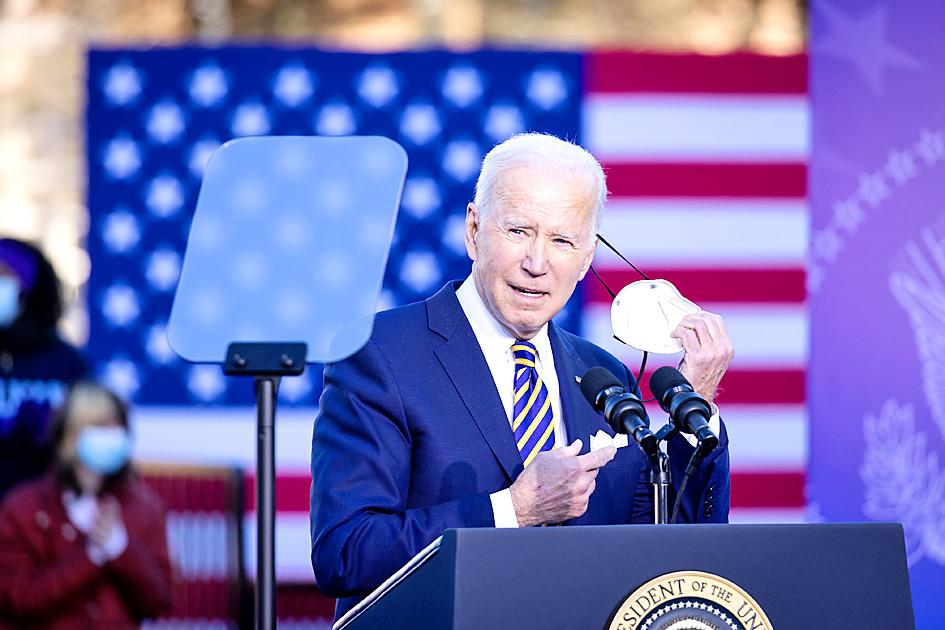US President Joe Biden on Tuesday took a major political gamble in calling for an end to the US Senate’s supermajority rule so that Democrats can override Republican opposition to voting rights reforms that he called crucial to saving US democracy.
Speaking in Atlanta, Georgia, the cradle of the civil rights movement, Biden — who declared the Capitol riot by supporters of former US president Donald Trump last year an “attempted coup” — said “this is the moment to decide to defend our elections, to defend our democracy.”
He challenged Democrats holding a razor-thin majority in the Senate to stand up for two bills that would expand access to polls and prevent practices that he said are being used to suppress black and other Democratic-

Photo: Bloomberg
leaning voters.
“Each one of the members of the Senate will be judged by history for where they stood before the vote and after the vote. There’s no escape,” the president said.
The 50 Democrats in the Senate support the two bills — but under current rules 60 votes are needed to get them passed.
Urging his party to “find a way,” Biden said that if Republicans do not cooperate then the supermajority rule, called the filibuster, should be tossed out.
“I support changing the Senate rules whichever way they need to be changed, including getting rid of the filibuster,” he said.
It is a high-risk, high-gain issue for Biden, who is infuriating Republicans, while also trying to balance the more conservative wing of his party with the increasingly frustrated black community.
Coming off a powerful speech last week to mark the Jan. 6 anniversary of an attempt by Trump’s supporters to overturn the 2020 presidential election, Biden described the push to enshrine greater voter protections as “a turning point.”
Following Trump’s bid to reverse his election defeat in 2020, Republicans in state legislatures had passed local laws “designed to suppress your vote, to subvert our elections,” he said.
Throwing down the gauntlet to the Senate, Biden said: “History has never been kind to those who sided with voter suppression over voter rights.”
“I ask every elected official in America: how do you want to be remembered?” he said
Democrats accuse Republican state legislatures of enacting a spate of local laws deliberately restricting the voting rights of minorities, and curtailing early voting and mail-in voting in an effort to suppress Democratic support.
However, Republicans describe the Democrats’ Senate push as an attempt to manipulate the election landscape by switching power to federal authorities.
They are unanimous in opposing the two bills, which US Senate Majority Leader Chuck Schumer said could come up for a vote as early as yesterday.
To break that impasse, Biden is endorsing a rarely used maneuver circumventing the filibuster just for this vote. This would let Democrats pass the two voting rights laws without any Republican support.
The problem for Biden is that this so-called “nuclear option” is seen as a declaration of war by Republicans, who said it would open the floodgates to lifting the filibuster on all sorts of issues and end any semblance of bipartisanship in the chamber.

Taiwan is gearing up to celebrate the New Year at events across the country, headlined by the annual countdown and Taipei 101 fireworks display at midnight. Many of the events are to be livesteamed online. See below for lineups and links: Taipei Taipei’s New Year’s Party 2026 is to begin at 7pm and run until 1am, with the theme “Sailing to the Future.” South Korean girl group KARA is headlining the concert at Taipei City Hall Plaza, with additional performances by Amber An (安心亞), Nick Chou (周湯豪), hip-hop trio Nine One One (玖壹壹), Bii (畢書盡), girl group Genblue (幻藍小熊) and more. The festivities are to

Auckland rang in 2026 with a downtown fireworks display launched from New Zealand’s tallest structure, Sky Tower, making it the first major city to greet the new year at a celebration dampened by rain, while crowds in Taipei braved the elements to watch Taipei 101’s display. South Pacific countries are the first to bid farewell to 2025. Clocks struck midnight in Auckland, with a population of 1.7 million, 18 hours before the famous ball was to drop in New York’s Times Square. The five-minute display involved 3,500 fireworks launched from the 240m Sky Tower. Smaller community events were canceled across New Zealand’s

‘IRRESPONSIBLE’: Beijing’s constant disruption of the ‘status quo’ in the Taiwan Strait has damaged peace, stability and security in the Indo-Pacific region, MOFA said The Presidential Office yesterday condemned China’s launch of another military drill around Taiwan, saying such actions are a “unilateral provocation” that destabilizes regional peace and stability. China should immediately stop the irresponsible and provocative actions, Presidential Office spokeswoman Karen Kuo (郭雅慧) said, after the Chinese People’s Liberation Army (PLA) yesterday announced the start of a new round of joint exercises around Taiwan by the army, navy and air force, which it said were approaching “from different directions.” Code-named “Justice Mission 2025,” the exercises would be conducted in the Taiwan Strait and in areas north, southwest, southeast and east of Taiwan

UNDER WAY: The contract for advanced sensor systems would be fulfilled in Florida, and is expected to be completed by June 2031, the Pentagon said Lockheed Martin has been given a contract involving foreign military sales to Taiwan to meet what Washington calls “an urgent operational need” of Taiwan’s air force, the Pentagon said on Wednesday. The contract has a ceiling value of US$328.5 million, with US$157.3 million in foreign military sales funds obligated at the time of award, the Pentagon said in a statement. “This contract provides for the procurement and delivery of 55 Infrared Search and Track Legion Enhanced Sensor Pods, processors, pod containers and processor containers required to meet the urgent operational need of the Taiwan air force,” it said. The contract’s work would be